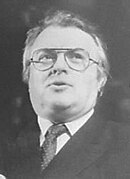| |||||||||||||||||||||||||||||||||||||||||||||||||||||||||||||||||
All 491 seats to the French National Assembly 246 seats were needed for a majority | |||||||||||||||||||||||||||||||||||||||||||||||||||||||||||||||||
|---|---|---|---|---|---|---|---|---|---|---|---|---|---|---|---|---|---|---|---|---|---|---|---|---|---|---|---|---|---|---|---|---|---|---|---|---|---|---|---|---|---|---|---|---|---|---|---|---|---|---|---|---|---|---|---|---|---|---|---|---|---|---|---|---|---|
| Turnout | 70.3% ( 74.5% ( | ||||||||||||||||||||||||||||||||||||||||||||||||||||||||||||||||
| |||||||||||||||||||||||||||||||||||||||||||||||||||||||||||||||||
| |||||||||||||||||||||||||||||||||||||||||||||||||||||||||||||||||
| This article is part of a series on |
 |
|---|
|
|
Legislative elections were held in France on 14 and 21 June 1981,[1] to elect the seventh National Assembly of the Fifth Republic.
The Socialist Party (PS) achieved the biggest electoral success of their history. This result marked the triumph of Mitterrand's strategy. Like the Gaullist Union of Democrats for the Republic in 1968, the PS obtained an absolute parliamentary majority. The French Communist Party (PCF) obtained its poorest result since 1936 and lost the half of its MPs, most of them to the PS. However, four Communists became members of Pierre Mauroy's government. This was the first PCF governmental participation since 1947. The two main right-wing parliamentary parties, the Rally for the Republic (RPR) and Union for French Democracy (UDF), lost the half of their seats too. This result earned the nickname "the pink wave" from the press.



